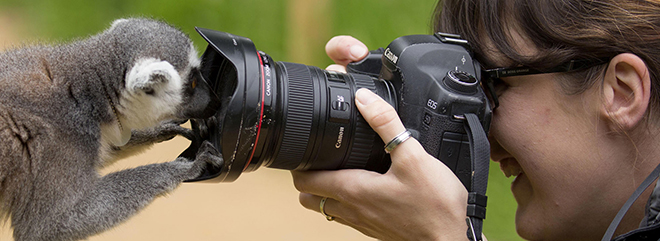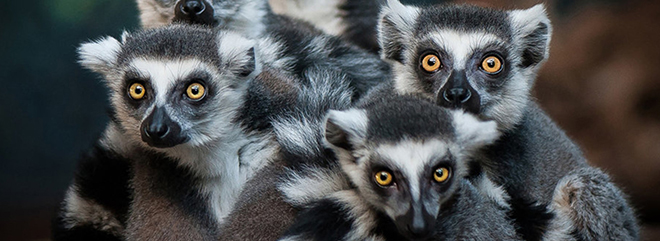


-
DESCRIPTION
VOLUNTEERING
ENRICH YOUR LIFE
Volunteering can enrich your own life in so many ways without that being your intention. It offers new life experiences and insights into social and developmental issues, as well as the inner workings of non-governmental and community organizations. An opportunity to travel abroad and experience diverse cultures, assisting local communities or environmental projects while seeing the world at the same time. Volunteering has also proven to help boost the self-confidence, getting you out of your comfort zone and dealing with real-world problems. You’ll probably discover a sense of personal achievement and satisfaction while cultivating enriching friendships at the same time.
Madagascar is one of the most heavily impacted countries in terms of habitat loss, with some estimates indicating that almost 90% of native forest has been lost, leaving very fragmented small pieces of forest left. Research and conserve the most endangered primates in the world, Lemur. This program will help volunteers to gain a better understanding of their ecology and implement practical conservation measures to conserve their habitat.
PROJECT HIGHLIGHTS
Discover strange and beautiful Madagascar
Study the most endangered primate in the world in one of the world’s most biodiverse regions
Make lifelong friends and return with incredible stories, photos and memoriesFAST FACTS
Location Madagascar
Activities Night and day surveys to monitor lemur populations
Building, installing and monitoring nest boxes
Reforestation work
Habitat surveys and mapping of vegetation
Get involved in surveys on many other species: birds, butterflies, reptiles, lizards and invertebrates
Assessing human disturbance
Recording how local communities use their precious natural resources
Relax on beautiful beaches and snorkel in warm waters to discover the marine life as well
Transport Airport pickup weekly on a Monday. Alternative start dates possible at additional cost
Transfer to town centre and beach camp from Nosy Be Airport weekly on a Monday
Accommodation Communal beach campHelp conserve species found nowhere else on earth
Nosy Be’s fauna includes three species of lemur: the diminutive mouse lemurs, which are the smallest primates on earth, the black lemur and the Hawks sportive lemur. This project aims to help conserve the lemurs of Madagascar through scientific data collection and more practical methods designed to improve their habitat, which you will have the chance to get involved in whilst on the project. Volunteering team is currently collecting data on all species of lemur on the island through a series of night and daytime surveys designed to study their populations within various habitat types in order to assess their needs and preferences. This includes detailed study of the plants and structures within the habitat, from determining individual species of plant and tree to estimating the density of trees in the area. The best proven method for conserving a wide range of species is to reduce human land use from agriculture and urbanisation and reforest the land. In order to achieve this, volunteering team is working with local people better to understand their land use and to implement a reforestation programme to maintain a suitable habitat for lemurs and other species. In addition to these activities, Volunteering tram is working with local partners to build, install and monitor nest boxes, which will provide lemurs with shelter in areas where the natural habitat is lacking.
Other species that you may get the chance to see and study include rare and endangered chameleons, turtles, snakes and geckos, including the superbly camouflaged leaf-tailed gecko (Uroplatus).There is also a spectacular variety of bird and butterfly life on the island, with the highest levels of endemism of any similar sized area in the world, as well as some elusive tenrecs – a group of mammals that are incredibly diverse, filling niches in aquatic, terrestrial, arboreal and fossorial environments, and resembling everything from otters to hedgehogs.
Empower Malagasy communities
You will be assessing the local flora and fauna of the region through biodiversity surveys of lemurs, but also other mammals, birds, butterflies, reptiles and amphibians, with the aim of informing and educating the local government and communities. It is our goal to leave a lasting impact in the region and to help the local communities appreciate and conserve their local environment and avoid the pitfalls of exploitation. You will interact with the community providing environmental education days, which will enable you to evaluate the impact of the human population on the wildlife and help to develop ideas allowing the community to lead more sustainable lifestyles.WHAT WILL I BE DOING?
The main aims of the programme are to assess the status of the lemurs in this little studied area and work on practical conservation methods to improve their habitat. We hope to gain insights into how each species is responding to human induced habitat modification and other anthropogenic stresses. It is our aim to discover which species are able to adapt and cope with human interaction and which species may be intolerant to any form of disturbance. By helping us to find out which species are most vulnerable to human disturbance, we can help design specific conservation action plans for better conservation management in the future and inform the local entities responsible for managing the forests.Your activities will vary based on the time of year and length of your stay, but you can expect to be involved in a wide range of activities, focusing on lemurs, but also with the opportunity to study other Madagascan species. You will be involved in day and night surveys of local lemur populations, as well as surveys on their habitat to determine their habitat needs and preferences and investigate how they are responding to deforestation and other anthropogenic influences. Our reforestation work that you may be involved in centres around working in our tree nursery to grow native plants, which will be replanted in degraded areas to provide additional habitat and protection for lemurs and other species. A programme of building, installing and monitoring nest boxes is exciting work to be involved in, providing essential protection for lemurs where their natural places for shelter have been lost. Other work you can expect to be involved in includes work with the local communities better to understand their land use and to raise awareness around the importance of the species that inhabit their land and the need for reforestation.
If this is your first time doing conservation work, don’t worry! It will only take a short while for you to feel totally at home on camp and confident with the science work. Although the work is intense you’ll find that living in such a beautiful and inaccessible environment alongside friends who share your passion for conservation will be the experience of a lifetime!
You’ll find your team to be a fun, dynamic mix of ages, usually between 18 and 25, although no age limit applies, and experiences, with members who all share a passion about travelling in developing countries and saving endangered life. Your staff will be young, friendly individuals who are highly experienced in their field and many may have volunteered on a volunteering projects earlier in their career.Sample Itinerary*
06:30 – breakfast; bread, sandwiches or cebada
08:30 – day time lemur survey
11:00 – Get involved in some butterfly surveys
12:30 – lunch: rice and beans!
13:30 – work in the tree nursery
16:00 – revision or presentations
18:00 – dinner; rice and beans, or option to eat out in the village
19:00 – night walk for nocturnal lemurs
*This itinerary should only be considered as an example of the kind of activities and timescales to expect. Actual itineraries may vary depending on the season and the requirements of the project. -
Inclusions
1 week of stay at communal beach camp,
Basic nutritious camp food (Part of your role on camp will be to help with the cooking),
Airport transfers,
Pre-departure support,
local orientation & training,
Project: Day time Lemur survey, butterfly surveys, night walk for nocturnal Lemurs and work in the tree nursery. -
EXCLUSION
Airfare
Visa
Optional tours, excursions and activities.
Travel Insurance
All other services not mentioned under ‘Inclusions’ -
TERMS & CONDITIONS
*Prices mentioned is starting from, per person based on 2 persons travelling together and sharing twin/double room, subject to seasonal surcharges and availability.
ITL World reserve the right to amend the prices in case of currency fluctuations, changes in rates of exchange, and/or fuel costs, special or high season charges and hike in the airline/hotel/rail/land transportation charges before the date of departure.
For convenience of passengers and / or feasibility of operations, ITL World or their service providers may sometimes amend the itinerary.
International hotel check in time is between 2pm and 3pm and check out time is between 11am and 12pm. (Exceptions apply). Early check in and or late check-out is subject to availability of rooms and may be chargeable.
It is the responsibility of the passengers to ensure they hold valid passport, visa, travel and medical insurance, vaccination etc., as applicable for each destination.
City/tourist tax as applicable, must be paid directly at the hotel.
To assist with visa application process, ITL World would provide copies of air tickets, travel insurance and other ground service vouchers for bookings made and fully paid for. Approval and issuance of visa is at the discretion of respective Embassies or Consulates and ITL World cannot in anyway influence this process. Certain nationals however receive visa on arrival in select countries, subject to prior online approvals.
Social Share

